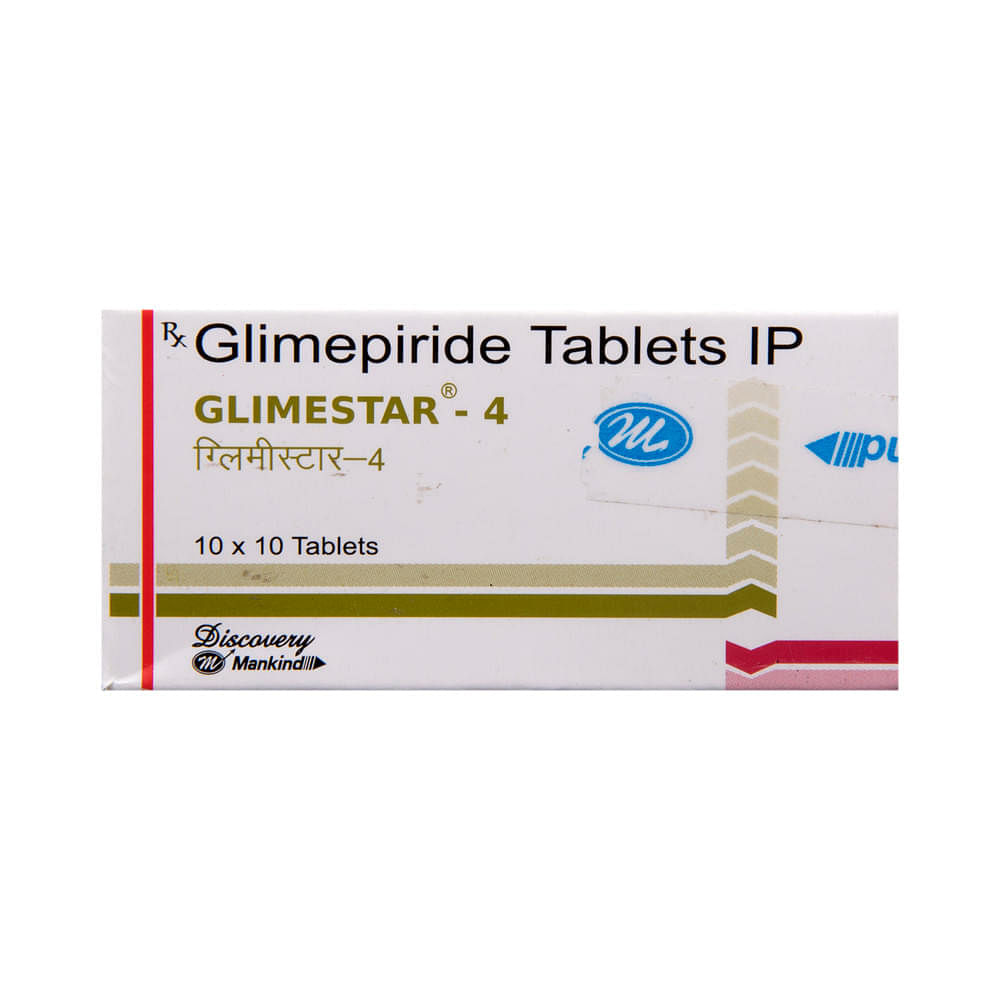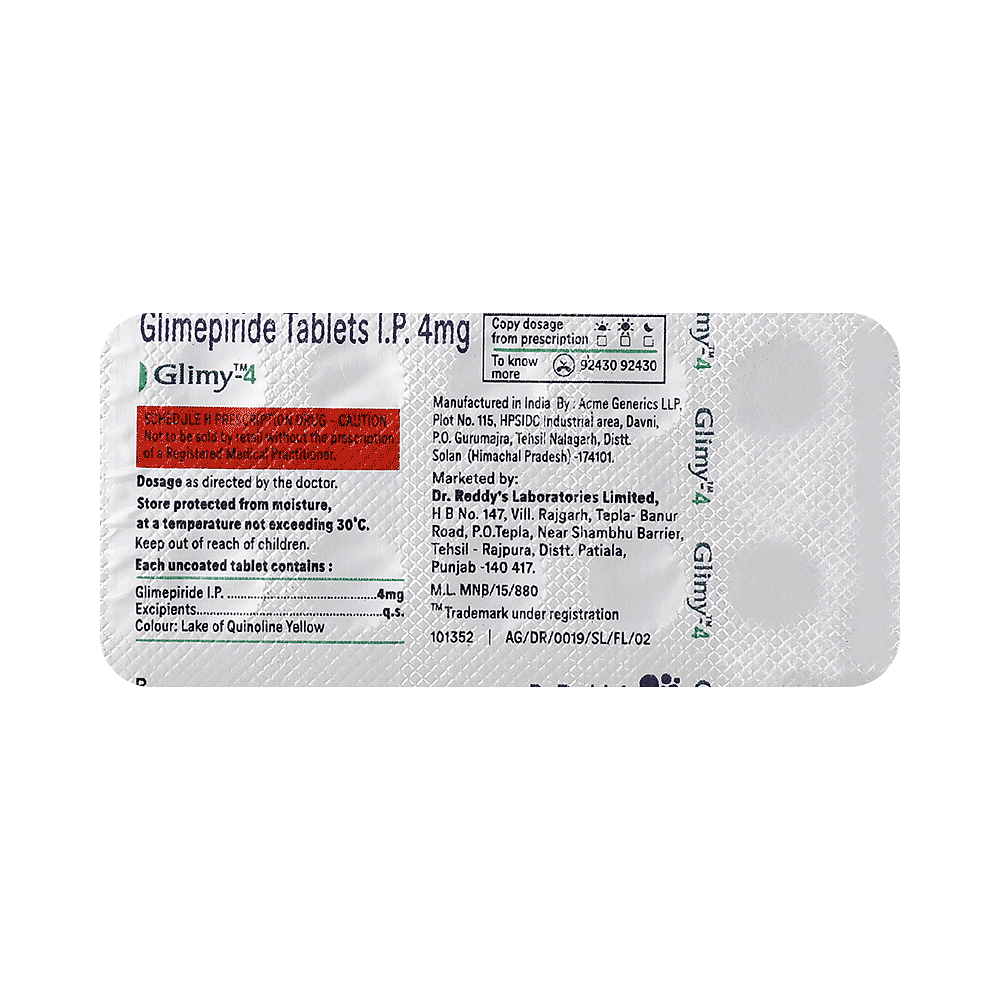
Glistra 4mg Tablet
Manufacturer
Astra IDL MAX
Salt Composition
Glimepiride (4mg)
Key Information
Short Description
Glistra 4mg Tablet is a sulfonylurea medication used to treat type 2 diabetes mellitus in adults, controlling blood sugar levels and preventing complications.
Dosage Form
Tablet
Introduction
Glistra 4mg Tablet is an antidiabetic medication that helps control blood sugar levels in people with diabetes, thereby preventing serious complications such as kidney damage and blindness.
Directions for Use
Take this medicine in the dose and duration as advised by your doctor. Swallow it as a whole. Do not chew, crush, or break it. Glistra 4mg Tablet is to be taken with food.
Safety Information
Side Effects
No common side effects listed.
Alcohol Warning
It is unsafe to consume alcohol with Glistra 4mg Tablet.
Breastfeeding Warning
Glistra 4mg Tablet is probably unsafe to use during breastfeeding. Limited human data suggests that the drug may pass into the breastmilk and harm the baby.
Pregnancy Warning
Glistra 4mg Tablet may be unsafe to use during pregnancy. Although there are limited studies in humans, animal studies have shown harmful effects on the developing baby.
Interacting Medicines
Trimethoprim Amiloride Atenolol Beclometasone
How it works
Glistra 4mg Tablet is an antidiabetic medication that works by increasing the amount of insulin released by the pancreas in order to lower blood glucose.
Quick Tips
Take Glistra 4mg Tablet shortly before or with the first main meal of the day Exercise regularly Eat a healthy diet and take other diabetes medicines (if prescribed) alongside Monitor your blood sugar level regularly Glistra 4mg Tablet can cause hypoglycemia when used with other antidiabetic medicines, alcohol, or if you delay or miss a meal
Related Medicines

Glimestar 4 Tablet

Glimisave 4 Tablet

Glimy 4 Tablet

Glimiprex 4 Tablet

Diapride-4 Tablet

Glador 4 Tablet

Zoryl-4 Tablet

Glimcip 4mg Tablet

Glimibrit 4mg Tablet

Melipride 4mg Tablet
Frequently asked questions
What is the dosage of Glistra 4mg Tablet?
The recommended starting dose of Glistra 4mg Tablet is 1 mg or 2 mg once daily, administered with breakfast. If you are at a higher risk of low blood sugar (e.g., the elderly or patients with renal impairment), you will be given a starting dose of 1 mg once daily. The usual maintenance dose is 1–4 mg once daily. The maximum recommended dose is 8 mg once daily. After reaching a daily dose of 2 mg, the dosage will be increased not more than 2 mg at 1- to 2-week intervals, based on your blood glucose level.
Does Glistra 4mg Tablet make you sleepy?
Glistra 4mg Tablet itself does not cause sleepiness. However, it may cause hypoglycemia (low blood sugar) when used with other anti-diabetes medicines. Because of this you may feel sleepy or have problems in sleeping.
Is Glistra 4mg Tablet safe for kidneys?
Glistra 4mg Tablet does not affect kidneys in patients with normal kidney function. However, its use should be avoided in patients with severe kidney disease since Glistra 4mg Tablet is principally eliminated by the kidneys.
Does Glistra 4mg Tablet cause memory loss?
No, it is not known that Glistra 4mg Tablet causes memory loss. However, the use of Glistra 4mg Tablet may cause low blood sugar which may cause problems with concentration and reduced alertness.
What should I avoid when taking Glistra 4mg Tablet?
It is advisable to avoid foods that are high in saturated and trans fats, instead consume fats from fish and nuts. Control your carbohydrate intake as this directly affects your blood sugar.
Can people with diabetes have proteins?
Yes, people with diabetes must include proteins along with other essential nutrients in their daily diet. Proteins are one of the major energy providers among all essential nutrients. Besides, being the building blocks of the human body, proteins break down into glucose to release energy. Unlike carbohydrates, the metabolism of proteins into glucose is much slower. Therefore, the spike in blood sugar levels might occur after a few hours when you are on a high-protein diet.
Are artificial sweeteners good for people with diabetes?
No, artificial sweeteners are not good for people with diabetes. They are composed of chemicals that can cause mild to severe side effects. Thus, it is better to limit or avoid their use as much as you can.
Can diabetes cause kidney failure?
Yes, uncontrolled diabetes can cause kidney failure. In the long run, diabetes can affect the kidneys leading to a condition called diabetic nephropathy. Diabetic nephropathy is a condition that is a major cause of kidney failure in patients with diabetes. The best way to prevent damage to kidneys is by keeping diabetes in check, making dietary changes, monitoring sugar levels regularly, getting routine blood tests done, and taking prescribed medications on time.
Can diabetes be cured?
Diabetes is a condition that causes changes in your blood glucose levels, which if left uncontrolled, can lead to serious health complications affecting the heart, brain, kidneys, and eyes. However, with simple lifestyle changes, diet, and medications, one can manage their condition and lead a healthy life.


